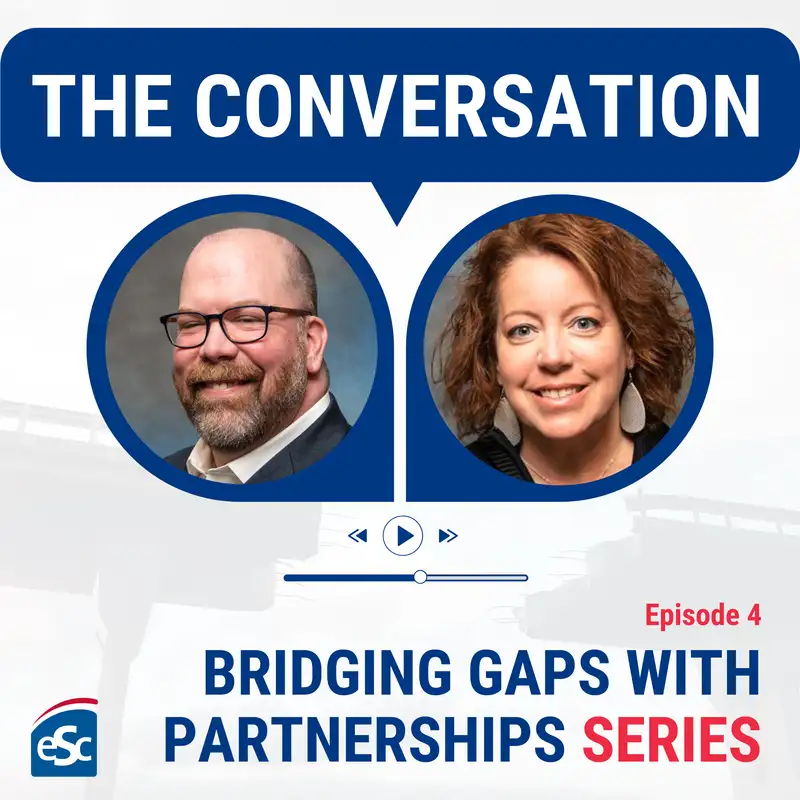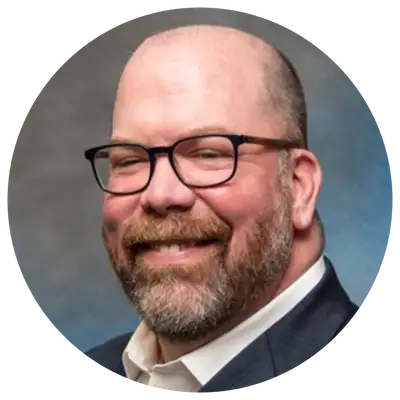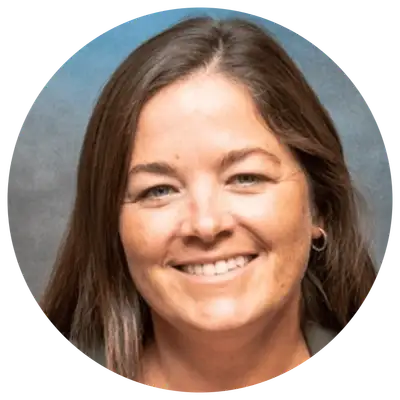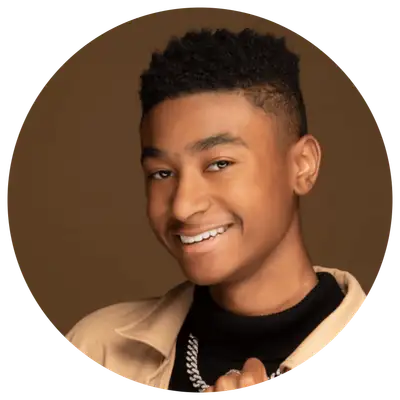
CCMEP: One of Ohio’s Best Kept Secrets
Gerrie Cotter: We can help them get paid work experiences so that they can see what types of work they enjoy doing, what maybe they don't enjoy doing, and help them figure out what path they might like to take going forward.
Narrator: That was Gerrie Cotter, manager of the Comprehensive Case Management and Employment Program at the Ohio Department of Job and Family Services. On this episode of the conversation, John and Christina explore the wide-ranging services CCMEP provides and speak with Dalen Hill, a student whose career has been transformed by these impactful programs. Let's dive in.
John Hambrick: Welcome back to the conversation, Ohio Voices in Education | Igniting Ideas, Inspiring Change. I'm so glad you're back with us. My name is John Hambrick. My esteemed colleague, Rachel Daniels, is unable to be with us today. So one of the original partners here with The Conversation. Christina Grady-Watts, is joining us today. Christina, welcome back.
Christina Grady Watts: Thanks. I'm happy to be here.
John Hambrick: Outstanding, and this is such an incredibly rich conversation for our listeners today. Having access and understanding the partnerships and the resources available through the state's Comprehensive Case Management Employment Program here in the state of Ohio, which is available in all 88 counties. So this is going to be so good not only having Gerrie Cotter, the CCMEP project manager with us today, but we also have Dalen Hill, currently a phlebotomist with Ohio Health, but a current recipient of the CCMEP Resources who happens to reside in Franklin County, so they call it AMP.
Gerrie and Dalen, welcome to the conversation. And Gerrie, as we kind of get started, can you just tell our listeners just a little bit about yourself?
Gerrie Cotter: Sure. I have worked at the Ohio Department of Job and Family Services for 14 years. I have been involved in the CCMEP program at the state level since its inception in 2016, and I really enjoy working on this program. It's Ohio's workforce development program for young adults and we are serving in adults ages 14 to 24. Of course, that age limit is only for initial eligibility. We continue to serve them after they get beyond 24 as well if they need it, so looking forward to today's conversation.
John Hambrick: Excellent, thank you. Me too. And Dalen, welcome. So eager to hear how you've been able to utilize the resources. Would you mind sharing a little bit about yourself?
Dalen Hill: Yes. So I'm Dalen and I am currently a recent graduate from the Charles School and Ohio Dominican University. I graduated back in May with my associate's degree in cross-disciplinary studies and art. And aside from that, like you mentioned, I'm also a phlebotomist at Ohio Health and I'm an aspiring artist and entertainer.
Christina Grady Watts: That's great. Thank you both for being here. Gerrie, I'm wondering if we can kind of start with you and if you'd provide us with an overview of the Comprehensive Case Management and Employment Program.
Gerrie Cotter: Sure. So as we discussed, the Comprehensive Case Management and Employment Program is a workforce development program for young adults. Sometimes, it's called something different depending on which county you're located in. As John mentioned in Franklin, it's called AMP. And we provide youth with a career coach that can provide personalized services to the youth and support them in goals that they would like to achieve, whether it's a life goal or a career goal. We also provide employment and training services. One of the things that's fantastic about this program is it's well-funded, which you don't often hear, so we are combining two different federal funding sources, TANF, which is Temporary Assistance for Needy Families, and WIOA Youth, which is the Workforce Innovation and Opportunity Act. So we have over $120 million statewide to serve Ohio's young adults and some of the services we can offer are paid and unpaid work experiences, on-the-job training, internships, apprenticeship, pre-apprenticeship, of course, the career coaching aspects.
We can share information about labor market information and financial literacy training to help young adults with budgeting, tutoring if they need help with different subjects at school, entrepreneurial skills training, if they're interested in developing and starting their own business, leadership development to help us get more leaders ready for Ohio. We can also help with behavioral health referrals and counseling, potentially, post-secondary training preparation, if somebody needs to brush up their skills before they start post-secondary training. We can also help with tuition assistance and help folks get credentials like post-secondary credentials or even if they haven't gotten their high school diploma, we can help them to obtain that as well. And generally speaking, we work with low-income youth. We also work with some youth who have challenges to employment who may have come up through the foster care system or have been involved with the justice system. Maybe they have a disability. So there's lots of different youth that we can work with, including just youth who are low-income overall.
John Hambrick: And then Gerrie, just a follow-up. As you shared the bevy of resources and programming available for our future workforce here in the state of Ohio, is there a cost to students, to the 16 to 24-year-old to have access to these resources?
Gerrie Cotter: That's a great question, John. Actually, the services are free. The only cost is for the youth to work with their career coach and stay in touch with them, keep them posted on how things are going and to check in with them on a regular basis.
John Hambrick: You mean our participants have a little skin by working with that coach, growing their skills, having those really cool workforce experiences, and then eventually, full-time employment?
Gerrie Cotter: Yes, that's exactly what I mean.
John Hambrick: That's amazing. That is just amazing. Very cool. Gerrie, thanks for sharing that. And then can you share... we've got a lot of educators as our listeners and folks involved throughout K-12. Can you share with our educators just some examples of how they can utilize these services and how they could maybe also better partner with their respective CCMEP provider?
Gerrie Cotter: Yes, that's a great question. I think one of the key things educators can do is refer students who maybe are at risk of not graduating. For example, one of the things that we can help with is helping students who maybe want to take a less traditional path to getting their high school diploma. And maybe they're not great testers, right? We can help with paid work experiences. We can also help with getting them a short-term credential that can help them qualify to graduate from high school. So I think there's a great partnership between local CCMEP providers and school districts there. And I know that there are some partnerships already in place, but we can certainly use more partnerships between those two groups.
Also, students who maybe are graduating without a plan, they don't know what they're going to do after they graduate high school, would be great to refer to the CCMEP program. We can help them get paid work experiences so that they can see what types of work they enjoy doing, what maybe they don't enjoy doing, and help them figure out what path they might like to take going forward. And also, of course, as I mentioned earlier, students who are low income and may have other challenges. Also, students who are English language learners would be great to refer, students who might be homeless or runaways, individuals with disabilities, any students that are low income, may be receiving public benefits, any students that have involvement with the justice system, students that might be pregnant or parenting, and also any students that who are in 10th grade or higher, but they're below the ninth grade level in their math or reading skills also would be great to refer.
John Hambrick: What an open door to provide these resources to our Ohioans. I mean, just incredible. You shared something a little bit earlier about for... and I think CCMEP, as I understand it, really has two buckets of how they provide resources, for students, the age group that are in school and then the students that would technically be out of school, which may be through the regular graduation path or GED attainment. Correct?
Gerrie Cotter: Yes. Yes.
John Hambrick: So then for those students that are still in school, you had shared how to help them make sure that they can graduate. And we know within our state's graduation requirements, they've got to get their credit hours. They've got to have a demonstration of competency so that whether that's testing or their CCP classes or maybe enlistment or pre-apprenticeship. What a really cool avenue. And so are you seeing and from the ESU of Central Ohio and our participation in Franklin County with CCMEP, we're seeing a nice pulse of an increase around students participating in pre-apprenticeship. Are you seeing that more throughout the state of Ohio, students using industry-recognized credentials that are earned and internship and pre-apprenticeship participation to help them in their graduation path?
Gerrie Cotter: Yes, we are seeing that more across the state and particularly in partnership with the CCMEP program. So a lot of times, CCMEP can potentially pay for the wages for work experiences and sometimes, there's work experiences connected with pre-apprenticeship, so we are seeing a definite increase in that.
John Hambrick: Do you think our employers know that well enough that CCMEP programming can help pay a high school student's wage or just really, a CCMEP participant high school or out of school, right? Do you think our employers throughout the state of Ohio have a working knowledge of this resource?
Gerrie Cotter: I don't think they do. I think one of the challenges with the CCMEP program is it's unfortunately too much of a secret to folks. As much as we do try and get information out there about the program, I think employers need to be more aware of it because we can certainly provide services to help younger job seekers develop the skills they need that employers want and pay for a lot of those costs. And then I also think that a lot of youth aren't aware of the program either and sort of end up falling into the program by happenstance. And I know the name isn't great, I know that doesn't help, but I think I want to get more information out there about the program so we can enroll more folks and help more youth get prepared as needed so that they can have careers and also to help employers.
John Hambrick: Yeah, I'm hopeful that conversations like this will blow the lid off to help improve awareness, help accelerate partnerships. So no, thanks for being here and sharing this.
Christina Grady Watts: Dalen, I'm excited to bring you into this conversation a bit more. Will you take a few minutes and tell us about your experience in the program?
Dalen Hill: Sure. So like Gerrie had mentioned, I think more students definitely need to know about the program because when I first started, it was during my, I want to say, junior year of high school at The Charles. And I had heard of people talking about Lead the Way, the Lead the Way program, but nobody had ever came up to me and explained what it was directly. And so one day on my lunch break, there was a coach at a table and I just so happened to be walking past. I stopped, saw the sign, and I'm like, "Hey, what's this about" and that's how I ended up getting involved in the program.
And I'm so glad that I did that because Lead the Way, they allowed me to have so many great experiences like developing my skills in podcasts and media. They helped me determine where I wanted to go as far as the workforce with medical. I was able to take an STNA class through them and then eventually phlebotomy. And some of the coaches, they even inspired me to keep going within the entertainment industry when it comes to supporting me on my music journey or acting journey, modeling journey and it's not always about just the work experience or the monetary benefits, but just having someone there to actually support you and encourage you, it really means a lot.
Christina Grady Watts: What did that support and encouragement look like? So if I'm a student interested in this program, what would you tell them it looked like?
Dalen Hill: Having coaches reach out to you, not just in school, but even outside of school, so through texts, a phone call, "Hey, how's things going?" Doesn't even have to be just about school. How is life? How are you? How can I help you in any sort of way and just having somebody to talk to as a friend.
Christina Grady Watts: Yeah, that's fantastic. I can see how that would be really supportive. Now through this program, did you earn certain credentials? Did you have any like CCP opportunities for college credit? Can you talk a little bit about that?
Dalen Hill: Yeah, so like I said, I was already doing the dual enrollment at The Charles School and Ohio Dominican. But through the AMP program, I was able to learn about VIP Medical Academy and they actually paid for me to go to their STNA program during December of 2023, I think? And that was a great experience. Everybody was really friendly, and it was a great way for me to earn that certificate. And then actually this year, back in June, I was able to do the phlebotomy program through them. And I also have done the podcasting and event planning through Yamo Media because of them. So there's a lot of opportunities for many different routes in life.
Christina Grady Watts: Absolutely. And now you're at Ohio Health and you're still pursuing some other career options. Do you want to talk a little bit more about your hopes and dreams with that?
Dalen Hill: Yeah, so I actually got my job at Ohio Health because of the AMP program. Again, Lead the Way, they had a job fair at the time when I was actually in the podcast and event planning course and someone from Ohio Health happened to be there and we ended up talking and they're like, "Hey, we have this, this, and this going on." And it was just a way for us as students to showcase our skills and see what all we're interested in. And I ended up getting hired as an environmental service associate there, so cleaning patient rooms, offices, and things like that. And then within there, I was able to, again, take the phlebotomy program and eventually transfer over.
And as far as the other things like entertainment, definitely the podcasting and event planning program helped with that. Learned a lot about photography, editing, all sorts of things and all the coaches and all the leaders involved in the AMP program, they're so supportive with everything that I do, music, acting, modeling, everything.
John Hambrick: This is incredible to learn. And I think, one, to help our listeners, you keep referring to AMP. AMP is an acronym for one of the six different CCME providers in Franklin County. And AMP happens... it stands for... do you know what it stands for, Dalen?
Dalen Hill: Is the last one Prosper?
John Hambrick: Achieve More and Prosper.
Dalen Hill: Okay.
John Hambrick: Yes. And you have been a great example of achieving more and prospering as a result of the resources that have been made available to you. And it's not just that the resources were made available to you, but man, you inquired and then you pursued and then you persisted. That is incredible. And hey, let me ask you. How are we doing on podcasting?
Dalen Hill: So podcasting, well, we're actually in a podcast right now, so I say we're doing pretty good.
John Hambrick: Awesome. Awesome. I love it. I love it. Again, Dalen, thanks for sharing. This is what a rich example for our listeners to share and our educators to learn of how they can say, "Oh, look, we've heard what Dalen's path has been thus far as a result of talking to a provider, pursuing the resources with the provider, and then taking full advantage of an earn and learn model." So very cool. Thank you so much.
Dalen Hill: Of course.
John Hambrick: Gerrie. I'm going to step to you real quick here. There's a lot. You shared exactly what CCMEP is and there are so many avenues to access for student population, both in school and not at school. But how would you suggest that folks get connected to CCMEP and how would you think that these resources would be available for a referral for those students?
Gerrie Cotter: Sure. So I shared a link that includes the contacts for CCMEP, local program contacts in each county in Ohio, but also if we're talking about school districts and educators, they could connect with their local OhioMeansJobs center. And the OhioMeansJobs center is always going to be able to connect them to the CCMEP program. Sometimes, it is run through the OhioMeansJobs center, but sometimes, there may be a youth service provider that works directly with the youth. But again, our OhioMeansJobs center is always going to be aware of the program, know who to connect with in that county, and then this link that I shared also will take you to our website at the state. We also have a chatbot that can answer questions for youth and other folks that are interested in the program as well. And the contact list is available on that website page too.
John Hambrick: Outstanding. And we will, of course, make that link available through the resources with The Conversation through the ESC of Central Ohio's landing page for this. I have to tell you, I am so pleased that we have been able to spend some time together to share the great resource that is CCMEP and then Gerrie, thanks for sharing with the folks that, "Hey, this is [inaudible 00:20:58] OhioMeansJobs," one of many resources available through OhioMeansJobs, and then also CCMEP. So what a great way for our listeners to be like, "Oh, this is how that one student I've been trying to help, here's a way I can do that. Here are multiple students I've been trying to help. Here's a way I can do that." And Dalen, you are inspirational, so we are thankful that you have come and shared with us, again, your journey thus far and how I am so optimistic on so much more for you to participate, be a continuous learner, and this has just been wonderful.
So on behalf of Christina Grady-Watts, our friend Rachel Daniels, and myself, thanks for joining us and keep The Conversation going.
Creators and Guests



